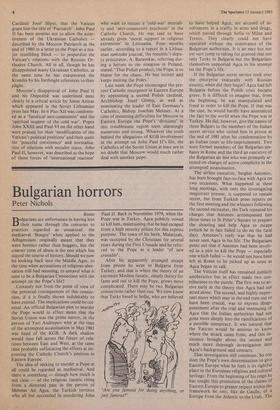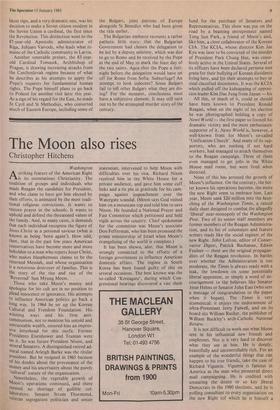Bulgarian horrors
Peter Nichols
Rome Bulgarians are unfortunate in having lent their name through the centuries to practices regarded as unnatural: the mediaeval 'Bougre' when applied to the Albigensians originally meant that they were heretics rather than buggers, but the coarser term of abuse is the one which has stayed the course of history. Should we now be looking back into the Middle Ages, to the time when accusations of religious aber- ration still had meaning, to unravel what is seen to be a Bulgarian Connection with the attempt on the Pope's life?
Certainly not from the point of view of the potential consequences of this connec- tion, if it is finally shown indubitably to have existed. The implications could be col- ossal. An official Bulgarian plot to murder the Pope would in effect mean that the Soviet Union was the prime mover, in the person of Yuri Andropov who at the time of the attempted assassination in May 1981 was head of the KGB. A dark shadow would then fall across the future of rela- tions between East and West, at the same time probably suffocating the efforts at im- proving the Catholic Church's position in Eastern Europe.
The idea of seeking to murder a Pope at all could be regarded as mediaeval. And there is something — though how much is not clear — of the religious fanatic rising from a distorted past in the person of Mehmet Ali Agca, the Turkish terrorist who all but succeeded in murdering John
Paul 11, Back in November 1979, when the Pope was in Turkey, Agca publicly vowed to kill him, maintaining that he had escaped from a high security prison for this express purpose. The town of his birth, Malatiyah, was occupied by the Christians for several years during the First Crusade and he refer- red to the Pope as a leader 'of new crusades'.
After his apparently arranged escape from prison he went to Bulgaria from Turkey, and that is where the theory of an extremist Moslem fanatic, simply thirsty for fame and out to kill the Pope, grows more complicated. There may be two Bulgarian connections rather than one. We now know that Turks based in Sofia, who are believed 'Are you famous for doing anything, or just famous?' to have helped Agca, are accused of in- volvement in a traffic in arms and drugs, which passed through Sofia to Milan and Trento. They clearly could not have operated without the connivance of the Bulgarian authorities. It is an easy but not yet sure jump to taking for granted that not only Turks in Bulgaria but the Bulgarians themselves supported Agca in his attempt on the Pope's life.
If the Bulgarian secret service took over the enterprise (naturally with Russian assent), when did they begin? Agca had left Bulgaria before the Polish crisis became grave. It is difficult to imagine that, from the beginning, he was manipulated and freed in order to kill the Pope. If that was the case, he would hardly have announced the fact to the world when the Pope was in Turkey. He did, however, give the names of three Bulgars to the members of the Italian secret service who visited him in prison at the end of 1981 after his condemnation by an Italian court to life-imprisonment. Two were former members of the Bulgarian em- bassy in Rome and the third an executive of the Bulgarian air line who was promptly ar- rested on charges of active complicity in the attempted assassination.
The airline executive, Serghei Antonov, has been brought face-to-face with Agca on two occasions. What happened at these long meetings, with only the investigating magistrate present, is supposed to remain secret, but from Turkish press reports on the first meeting and the whispers following the second encounter, the Turk repeated his charges that Antonov accompanied him three times to St Peter's Square to prepare the shooting and help Agca to escape (which he in fact failed to do on the fatal day). Antonov's reply was that he had never seen Agca in his life. The Bulgarians point out that if Antonov had been involv- ed in a plot to kill the Pope — especially one which failed — he would not have been left in Rome to be picked up as soon as Agca began to talk.
The Vatican itself has remained publicly unobtrusive but in effect made two con- tributions to the puzzle. The first was to ar- rive early at the theory that Agca had not acted alone. The second, and highly impor- tant move which may in the end turn out to have been crucial, was to express disap- pointment after the trial and sentencing of Agca that the Italian authorities had not gone more deeply into the ramifications of a possible conspiracy. It was natural that the Vatican would be anxious to know where the attack came from, and this in- sistence brought about the second and much more thorough investigation into Agca's background and contacts.
That investigation still continues. So too does the Pope's own determination to give Eastern Europe what he feels is its rightful place in the European religious and cultural heritage. From the beginning of his reign he has sought this promotion of the claims of Eastern Europe to greater respect within the framework he sees, like de Gaulle, of a Europe from the Atlantic to the Urals. The latest sign, and a very dramatic one, was his decision to make a Soviet citizen resident in the Soviet Union a cardinal, the first since the Revolution. This distinction went to the 87-year-old Apostolic administrator of Riga, Julijans Vaivods, who leads what re- mains of the Catholic community in Latvia.
Another venerable prelate, the 83-year- old Cardinal Tomasek, Archbishop of Prague, is drawing increasing attacks from the Czechoslovak regime because of what he describes as his attempts to apply the Pope's requests for fundamental human rights. The Pope himself plans to go back to Poland for another visit later this year. As a sign of his regard for the East, he made St Cyril and St Methodius, who converted much of Eastern Europe, including some of the Bulgars, joint patrons of Europe alongside St Benedict who had been given the title earlier.
The Bulgarian embassy recounts a rather pathetic little story: that the Bulgarian Government had chosen the delegation to be led by a deputy minister, which was due to go to Rome and be received by the Pope at the end of May to mark the feast day of the two saints. Agea shot the Pope a fort- night before the delegation would have set off for Rome from Sofia. Subterfuge? An attempt to look innocent? Some Bulgars fail to tell other Bulgars what they are do- ing? For the moment, conclusions must have a subjective element. It may still turn out to be the attempted murder story of the century.







































 Previous page
Previous page